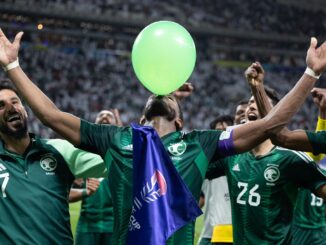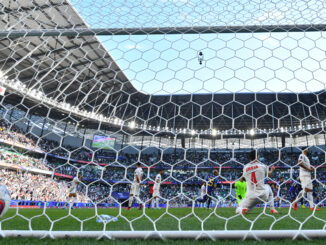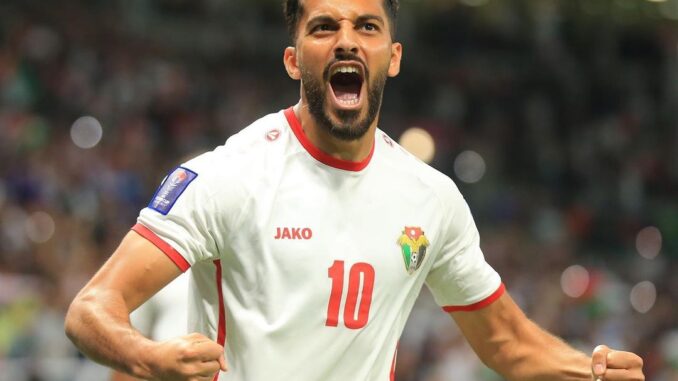
As his name echoed around the Ahmad bin Ali Stadium, there was no doubting who Jordanian fans felt deserved the accolades as their nation overcame expectations to progress to the AFC Asian Cup final for the first time.
‘Mousa! Mousa! Mousa!’ rang the cries in salute of Montpellier forward Mousa Al-Taamari, the golden boy of his nation’s game, as he held the ball in the corner, determined to run down the clock on the greatest night ever for Jordanian football.
With an assist for Yazan Al-Naimat’s opener and then a fine individual effort of his own in the 2-0 win, the 26-year-old had been instrumental in his team’s demolition of a Korea Republic side many expected to march to victory on Tuesday, on their way to finally breaking their 64-year Asian Cup hoodoo.
Instead, it is the Hashemite Kingdom that will be preparing for Saturday’s decider at Lusail Stadium against either Qatar or Iran, delivering on the sporadic promise that has been evident in the past, only for the nation to suffer heartbreaking defeat.
That was never more the case than in 2004, when China hosted the Asian Cup and Japan were the defending champions. Jordan were appearing at the Asian Cup finals for the first time, making their debut when the competition still featured 16 nations.
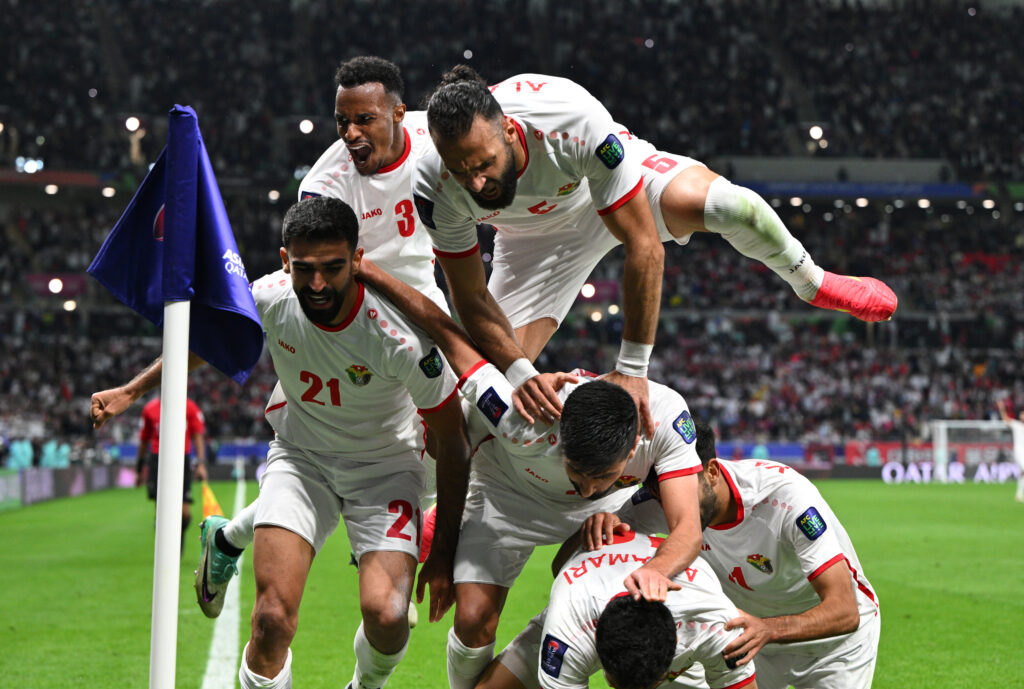
Coached by legendary Egyptian Mahmoud El Ghoary – who qualified his home nation for the FIFA World Cup in Italy in 1990 – a squad including a young Amer Shaafi in goal, alongside Badran Shakran and Amer Deeb advanced to the knockout rounds at the very first attempt.
Draws with South Korea and the United Arab Emirates bookended a 2-0 win over Kuwait to ensure Jordan’s progress and set up a quarter-final meeting with defending champions Japan in Chongqing.
Jordan’s progress to the last eight on their debut appearance was notable in itself, but that quarter-final has gone down in Asian Cup folklore for the circumstances surrounding the penalty shoot-out required to separate the teams after the game ended in a 1-1 draw.
Missed spot-kicks from Shunsuke Nakamura and Alex Santos meant Japan trailed 2-0 after the opening two rounds of penalties, prompting captain Tsuneyasu Miyamoto and coach Zico to complain to referee Subkhiddin Mohd Saleh over the state of the pitch.
Nakamura and Santos, both argued, had their ability to strike the ball affected by loose turf as they planted their standing foot into the ground. As a result, the Japan captain asked the Malaysian referee to consider switching the penalties to the other end of the pitch.
After some consideration, Subkhiddin – in a highly unusual move – agreed to the request and, although the Jordanians took a 3-1 advantage into the fourth round of penalties, El Ghoary’s players capitulated.
The next four penalties were missed as the shoot-out went into sudden-death and Japan eventually prevailed, not only winning the quarter-final but ultimately going on to lift the title for the third time in four tournaments.
While the Jordanians missed out on the 2007 finals in Thailand, Vietnam, Indonesia and Malaysia, they returned in 2011 in Qatar, with Iraq’s Adnan Hamed at the helm and another quarter-final exit to their name.
It took a 92nd minute header from Maya Yoshida for the Japanese to escape with a 1-1 draw against the Jordanians in the opening group phase clash between the pair, who both progressed to the last eight ahead of Syria and three-times champions Saudi Arabia.
However, two goals in two minutes from Uzbekistan’s Ulugbek Bakayev ended Jordanian hopes of moving beyond the quarter-finals.
The country continued to flirt with a place among Asia’s elite, however, qualifying for an intercontinental playoff for the FIFA World Cup in Brazil in 2014 after gaining revenge over Uzbekistan in 2013 to set up a meeting with Uruguay in an eliminator for the finals.
That, though, ended in a 5-0 aggregate defeat over two legs in Montevideo and Amman while Jordan’s involvement in the 2015 Asian Cup in Australia was cut short at the group stage.
Another appearance in the knockout rounds came in 2019 when Vital Borkelmans’ side progressed to the last 16 in the newly expanded competition in the United Arab Emirates, only to be knocked out by Vietnam.
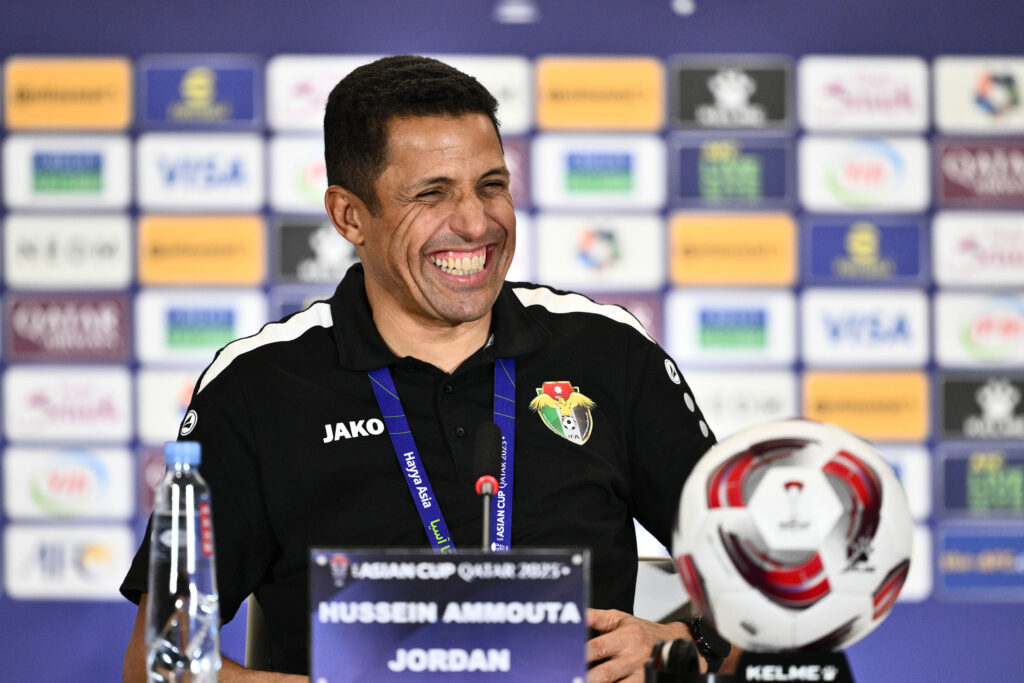
Little of that hinted at Jordan’s performance at the current edition of the Asian Cup and their remarkable run to the Saturday’s final. Win or lose, history has been made.
But for coach Hussein Ammouta, the achievement has to be the start of a journey towards establishing Jordan among Asia’s best.
“We have delivered a major accomplishment,” the Moroccan said after seeing off Jurgen Klinsmann’s side. “We need to invest in infrastructure, in the training and formation of our players to reach higher levels. We need to pay attention to age categories.
“What you saw today was the fruit of several years of work. We have Mousa Al-Taamari in the French league and hopefully we will have four or five Jordanian players in the French league or the English Premier League.
“When you look at Japan or Korea you see players who are playing abroad and they have great value to their national teams. This is what we should start planning for, how we will produce players who will play in the world’s biggest leagues. This a building block that’s part of a bigger plan.”
After brushing aside a Korean side boasting Europe-based trio Son Heung-min, Hwang Hee-chan and Lee Kang-in, Ammouta’s hopes of seeing more Jordanian players moving to the world’s best leagues are surely a step closer to being fulfilled.
Photo: Asian Football Confederation


